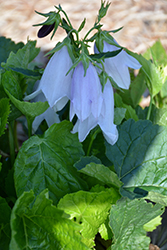It's all about ...
plants

Iridescent Bells Canterbury Bells
Campanula 'Iribella'
Height: 20 inches
Spread: 16 inches
Sunlight:
![]()
![]()
Hardiness Zone: 5a
Other Names: Bellflower
Description:
Loads of large, pale lavender bells emerge from eggplant-purple buds, on upright stems, in the early to mid-summer of its second year; allow some plants to self seed for future years; an attractive addition to the garden, and a great cut flower
Ornamental Features
Iridescent Bells Canterbury Bells has masses of beautiful nodding lavender bell-shaped flowers with lilac purple overtones at the ends of the stems from early to mid summer, which emerge from distinctive deep purple flower buds, and which are most effective when planted in groupings. The flowers are excellent for cutting. Its serrated heart-shaped leaves emerge light green in spring, turning bluish-green in colour throughout the season.
Landscape Attributes
Iridescent Bells Canterbury Bells is a dense herbaceous biennial with tall flower stalks held atop a low mound of foliage. Its relatively fine texture sets it apart from other garden plants with less refined foliage.
This is a relatively low maintenance plant, and is best cleaned up in early spring before it resumes active growth for the season. Deer don't particularly care for this plant and will usually leave it alone in favor of tastier treats. It has no significant negative characteristics.
Iridescent Bells Canterbury Bells is recommended for the following landscape applications;
- Mass Planting
- Rock/Alpine Gardens
- General Garden Use
- Container Planting
Planting & Growing
Iridescent Bells Canterbury Bells will grow to be about 16 inches tall at maturity, with a spread of 16 inches. Its foliage tends to remain dense right to the ground, not requiring facer plants in front. It grows at a medium rate, and tends to be biennial, meaning that it puts on vegetative growth the first year, flowers the second, and then dies.
This plant does best in full sun to partial shade. It is very adaptable to both dry and moist locations, and should do just fine under typical garden conditions. It is not particular as to soil type or pH. It is highly tolerant of urban pollution and will even thrive in inner city environments. This particular variety is an interspecific hybrid. It can be propagated by division; however, as a cultivated variety, be aware that it may be subject to certain restrictions or prohibitions on propagation.
Iridescent Bells Canterbury Bells is a fine choice for the garden, but it is also a good selection for planting in outdoor pots and containers. With its upright habit of growth, it is best suited for use as a 'thriller' in the 'spiller-thriller-filler' container combination; plant it near the center of the pot, surrounded by smaller plants and those that spill over the edges. Note that when growing plants in outdoor containers and baskets, they may require more frequent waterings than they would in the yard or garden. Be aware that in our climate, most plants cannot be expected to survive the winter if left in containers outdoors, and this plant is no exception. Contact our experts for more information on how to protect it over the winter months.
This plant is not reliably hardy in our region, and certain restrictions may apply; contact the store for more information.
